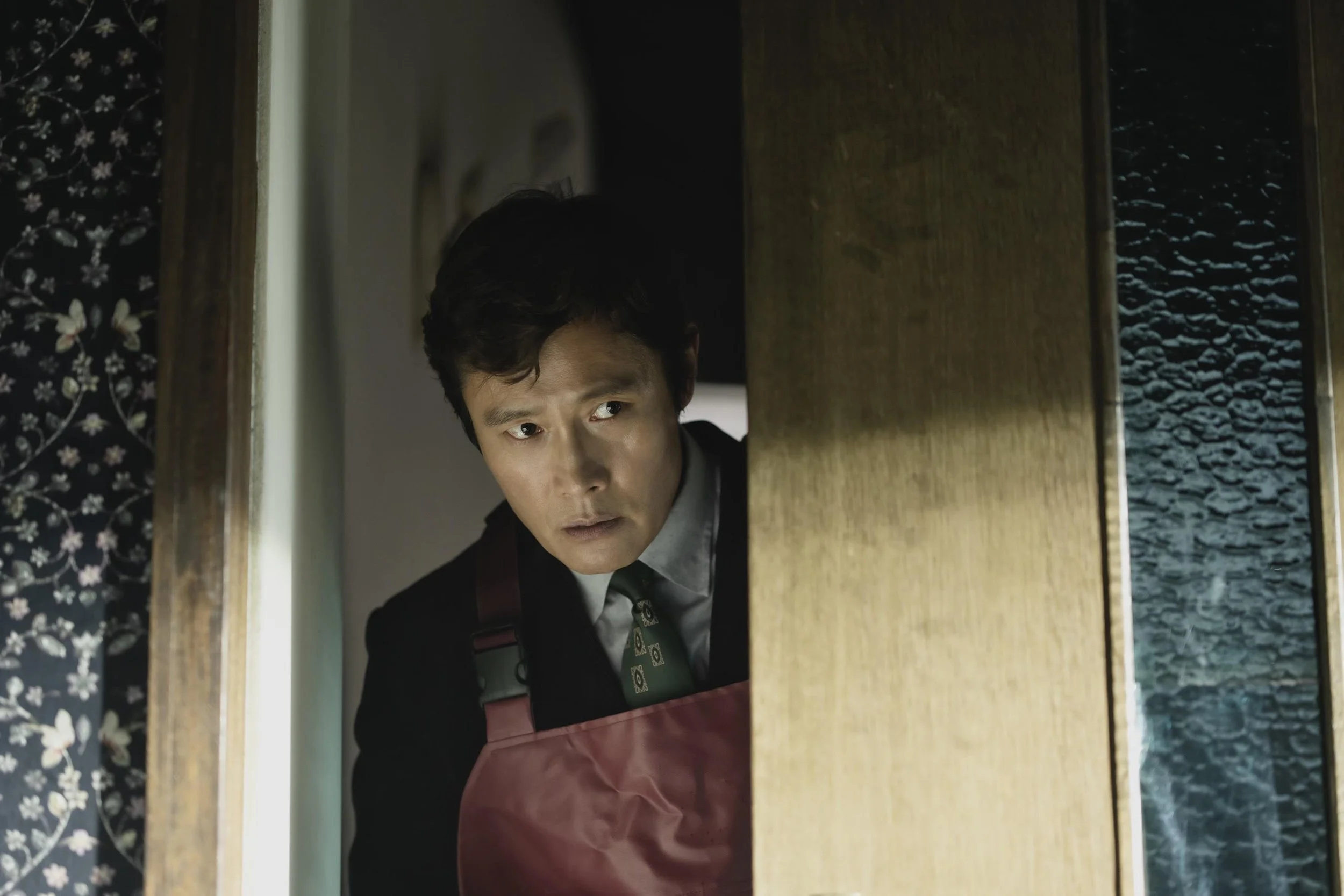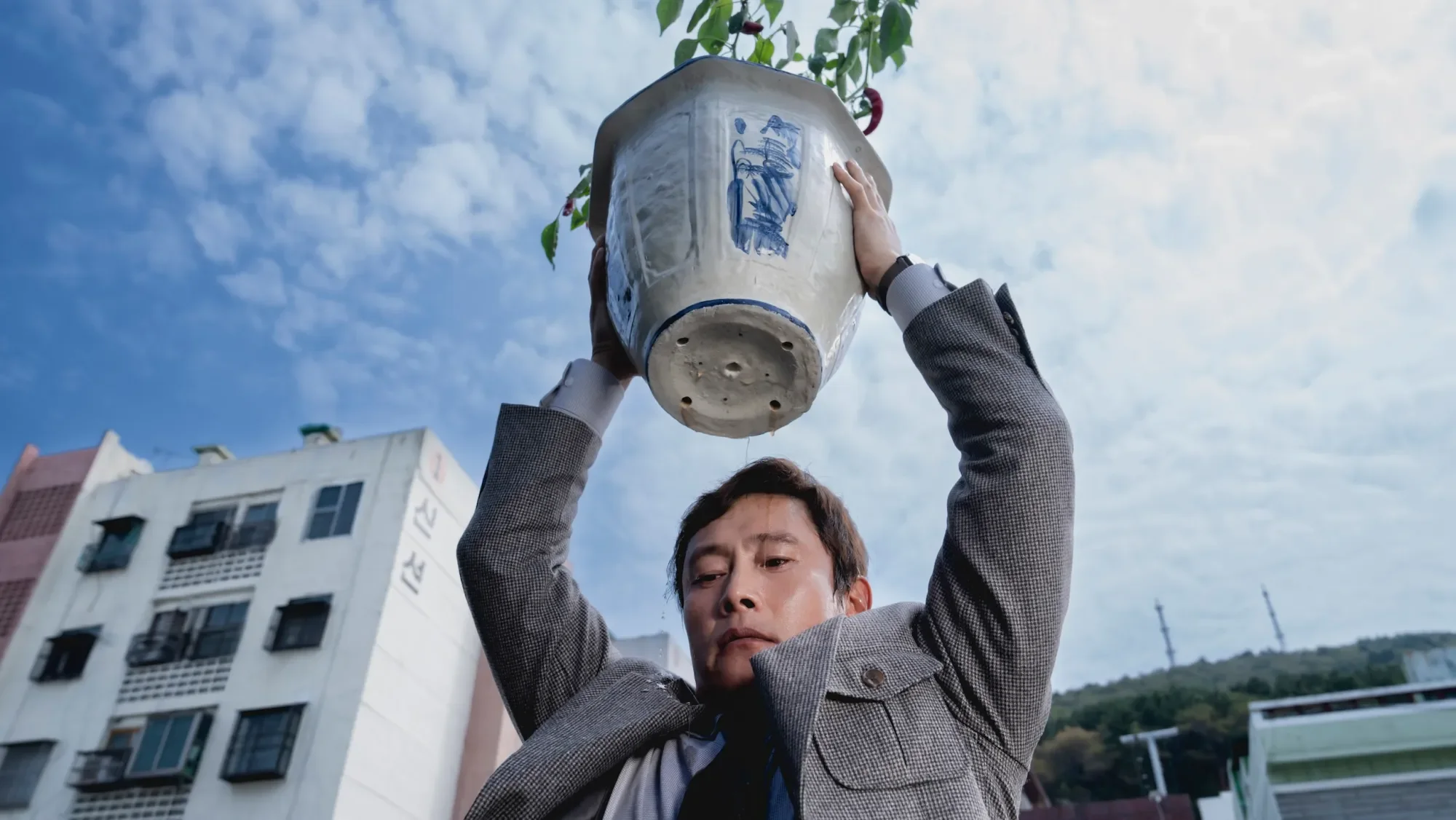TIFF 2025: ‘No Other Choice’ Review
There’s a resonance to the swiftness with which Man-soo’s (Lee Byung-hun) certainties crumble beneath his feet. Dedicated to his career with Solar Paper—and even having earned accolades as the Pulp Man of the Year—Man-soo suddenly finds himself the victim of layoffs after foreign investors take over the company. Twenty-five years of hard work now circling the drain, and plenty of peers facing similar circumstances, unemployment becomes its own cutthroat world in Park Chan-wook’s wicked satire, No Other Choice. A rare, outwardly comedic film from the esteemed Korean auteur layers itself with pointed critiques of a capitalist system devouring its workforce and the unstable nature of a world driven by exponential technological progress. Unsurprisingly incisive in its commentary on late-stage capitalism as a form of soul-sucking warfare, No Other Choice channels Park’s devilish wit through an incredibly empathetic performance by Lee, resulting in one of the funniest and most thoughtful satires of the year.
It’s the picturesque way we’re introduced to Man-soo that makes his fall from the top that much more painful to watch—and the desperation of his struggle truly sinks in. Having recently received a promotion that earned him enough money to buy his family home, there’s a sadness in thinking back to Man-soo’s grinning smile while he barbecues an eel received as a gift for his promotion. His daughter, Ri-one, practices her cello outside as their son, Si-one, joins his father and mother, Mi-ri (Son Ye-jin), on the patio to enjoy their dinner under the sunny sky. Their dogs, Ri-two and Si-two, play happily in the yard before retiring to their duplex version of a dog house. Man-soo’s passion for horticulture results in him building a sizeable greenhouse next to their estate where he can unwind from his day through some one-on-one time with his plants. The family has finally found some comfort after years of just trying to get things right where they want them.
Of course, the way Park leans into Man-soo’s joy and pride foreshadows the other shoe to drop. When his idyllic life loses its sturdy foundation, Man-soo finds the rest of his life falling to the wayside. His daughter’s cello lessons are becoming increasingly expensive, the mortgage has defaulted, his teeth are bothering him, and there’s a sneaking suspicion that his wife is cheating on him. Mi-ri is adamant that he should adjust and shift careers, but once you’ve spent 25 years at the same job, it’s hard to imagine getting back on your feet in another industry. Especially when layoffs are common and everyone, whether qualified or overqualified for a position, is in the same boat as Man-soo. There aren’t many options left, which leads Man-soo to hatch a ruthless plan to form a fake paper company and lure out qualified applicants and then systematically murder them. There’s simply no other choice.
The sad realization, as Man-soo actually begins plotting to dispatch his first victim, is that very few qualified candidates are doing too well themselves. There’s a universal sadness rippling through Park’s screenplay, co-written by Lee Kyoung-mi, Jahye Lee, and Don McKellar. It’s a script that doesn’t focus too much on the people at the top so much as it does those who are suffering in a very particular way. They could change careers, yes, but what does that say about these careers that are once thriving and now can easily clear out their workforce? What does it say about a society that is moving forward without adjusting for the human impact? And what’s the collateral damage to those who now find themselves without a career and much of their life wasted away? A blunt reference to the Vietnam War and its veterans accentuates the idea of people being tasked to do something and abandoned when no longer wanted or needed, creating all sorts of extenuating issues that a society is not willing to contend with in any meaningful manner. It may just be the paper industry, but the screenplay—and Donald E. Westlake’s novel, ‘The Ax’, which serves as the source material—is well aware of how universal the issue is and that economic conditions do not dictate it exclusively.
No Other Choice is bursting at the seams with thematic parallels and clever intricacies that make it a richer text than it initially seems. A very pointed critique of capitalism from Park is enough to be satisfying, especially once the violence begins to escalate and Man-soo becomes fully embroiled in his scheme. Still, the nuanced approach to every aspect of the film’s production makes what could have been a relatively straightforward story of survival even more fulfilling in its execution. Continuing to work with editor Kim Sang-beom yields the same striking transitions and overlapping images that have garnered Park’s films a distinct arthouse sensibility. Kim works on numerous Korean films, but it seems that only with Park do the two find some artistic symbiosis. There’s also another beautiful score from frequent Park collaborator Cho Young-wuk, which brings elegance to the chaos. Park has his mainstay of collaborators and rarely rocks the boat, leaving consistently high-quality films in his wake.
However, it’s the reunion of the film’s star, Lee Byung-hun, with Park that is the most notable collaboration in No Other Choice. Having not worked together since 2004, when Lee starred in Park’s short film Cut for the horror anthology Three… Extremes, Lee’s only past collaboration with the director was in 2000’s Joint Security Area—a film that Park considers his feature directorial debut, despite directing two films prior. If that’s the case, then Park has seen himself as a feature film director for about as long as the protagonist of No Other Choice has worked in the paper industry. Since 2000, Lee has established himself as one of the most prominent Korean actors, breaking through to international success—most notably with his performance in the Netflix series Squid Game. Lee’s presence brings the film significant attention, but what’s most enrapturing about it all is that No Other Choice contains one of Lee’s best performances in a career filled with iconic roles. It’s a strangely alluring cocktail of sadness, desperation, immasculation, and, above all else, pride that textures a hilarious turn as Man-soo.
There’s more beneath the surface of No Other Choice that warrants more reflection than mere asides, especially with the integration of Man-soo’s gardening into the narrative, the isolation formed from a lack of communication with his family, and the way Park seems to be commenting on the artistic struggle through someone willing to do anything to remain in an industry where stability is fragile. Park has stated in the past that he wanted No Other Choice to be his masterpiece. There are nitpicks here and there, and in a career filled with masterpieces such as The Handmaiden, Sympathy for Lady Vengeance, and Oldboy, it’s difficult not to want to challenge that notion. Park’s latest is packed with so many ideas that all stem from a common symptom of our current society, making it feel like the kind of film that will be even more rewarding upon revisit. Where it stands currently, though, is as a broadly appealing and resonant satire that is drenched in the grim reality that there is no such thing as stability in today’s constantly changing world. No Other Choice is another incredibly assured and impressive addition to Park Chan-wook’s astounding oeuvre and another reason why he is one of the best directors of our time.
The 50th Toronto International Film Festival took place from September 4th to 14th. No Other Choice celebrated its North American premiere on September 8th, as part of TIFF’s Gala Presentations program. The full list of films selected for the festival can be found here.


